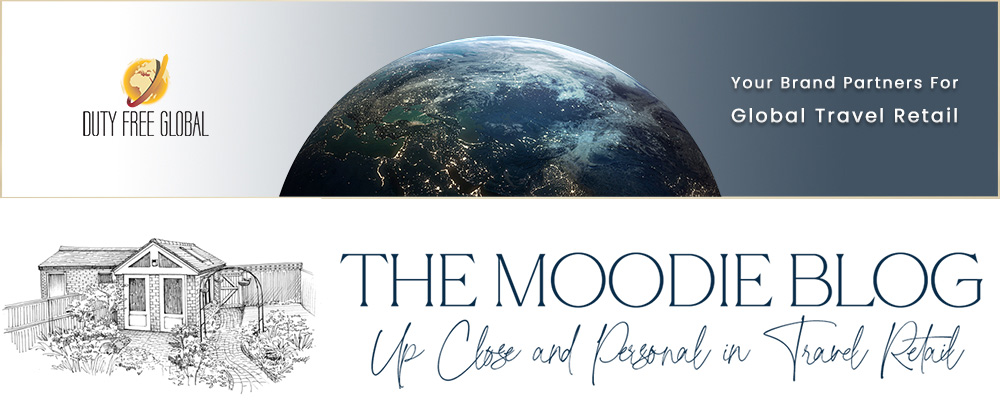Latest posts by Martin Moodie (see all)
- How I overcame Severe Tire Damage to become the oldest influencer in town - April 20, 2024
- Free as a (Kiwi) bird and flying high in Haikou - April 13, 2024
- Discovering Food Accademia’s world of fine flavours at a Hong Kong cha chaan teng - April 6, 2024
Days may be cloudy or sunny
We’re in or we are out of the money, yeah
But I’m with you always
I’m with you rain or shine – Ray Charles, Come Rain or Come Shine
It’s a bitterly cold morning in Seoul, about 6 °C, though it feels much colder. I’m standing outside Star Avenue, the Hallyu (Korean Wave) marketing entrance to Lotte Duty Free’s flagship store in Myeong-dong, Seoul. And I am not alone.



This is the most popular duty free store in the world’s biggest duty free market. Sales last year climbed by a remarkable 37% to an all-time high of over US$3.8 billion. Some 88% of sales were to foreign customers, most of them Chinese, led by daigou shoppers who have so dominated the Korean duty free business over the past two years since the THAAD anti-missile system row broke out between China and South Korea in March 2017.
As I noted in yesterday’s Blog, Korean travel retailers and their suppliers are anxiously monitoring the impact of China’s new e-commerce law, introduced on 1 January, which is in part designed to crack down on the daigou trade. But if the tap is being turned off, there’s little sign of it here. It’s a full hour before the Lotte Duty Free store opens and already a snake-like queue of around 400-500 Chinese daigou traders are queued up alongside the side of Lotte Department store and around the corner onto Namdaemum-ro.
If you add in another 100, perhaps more, already, in the pre-booked Star Avenue express lane waiting area, that’s around 600 ‘shuttle traders’ as they’re often called here, waiting to burst through the Lotte Duty Free doors and buy huge volumes of Korean and international beauty products, as well as a wide range of Korean fashion and accessories and certain international luxury and premium branded goods.


To any outsider, it’s a remarkable scene but to industry insiders here it’s just another day in Korean duty free. Similar scenes will be being played out outside Lotte’s rivals as the daigou shoppers queue up early to ensure they can procure the items most in demand in China.
The daigou phenomenon has rewritten the rules of engagement here. Brands’ long-held selective distribution principles have been scattered in the Korean winds – there’s certainly nothing selective about what amounts to a mass redistribution market, a little China of duty free. But the vast amounts of money at stake have simply convinced most beauty brands at least to turn a blind eye.
Are those winds about to turn even icier though than on this cool Seoul morning? Yesterday I met the investor relations team at prominent Korean beauty house AmorePacific (at the group’s stunning new headquarters pictured below), for whom Korean duty free accounts for around 40% of sales and over 20% of operating margin. The company was one of the few to restrict daigou purchases, a decision that came at considerable cost last year.



For AmorePacific, and especially its flagship brand Sulwhasoo, 2019 has started well enough (though a little slower than its competitors such as LG) and there is no sign yet of any major dent in the daigou business. The sight outside Lotte Duty Free this morning would seem to confirm that, but there is a distinct sense of unease here that things could change fast.
*****

I had the pleasure yesterday of interviewing The Shilla Duty Free President of Travel Retail Division Ingyu Han at company headquarters near the flagship store in Seoul. Sales here reached a record US$2.6 billion last year, up 40% year-on-year, with about 82% of them generated by foreigners, principally Chinese (many of them daigou).
The place was jam-packed during my visit at just after 2p.m. with Korean beauty brands (particularly LG’s The History of Whoo and AmorePacific’s Sulwhasoo) and fashion products such as Gentle Monster sunglasses drawing huge crowds. The same applied for international beauty brands such as Estée Lauder, Chanel, Dior, YSL, Shiseido and Lancôme.


Mr Han has played a key role in the company’s growing internationalism, which now embraces blue-chip airport contracts in Hong Kong, Singapore and Macau as well as its Korean downtown and airport strongholds. Look out for my major interview with him over coming weeks. It’s a refreshingly candid take on the challenges and opportunities facing Korean travel retail.
He believes that 2019 will be a good year for the company, but one marked by volatility. “There will be rain, there will be shine.” As always with travel retail, the mix will be vital.

